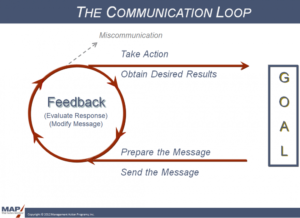Anticipate Reactions Before You Communicate
Have you ever delivered some news to your staff and been shocked or caught off guard by their reactions? Part of communicating effectively is anticipating how your audience will respond and then preparing, as best you can, for those reactions. Particularly if you’ve got tough information to discuss or deliver, it pays to prep, thinking about what people may think or say. By planning for a variety of responses, you’ll reduce the odds of being thrown off your game and can more adequately address concerns and feelings. This proactive, disciplined approach builds confidence while enabling effective communication.
Click here to download our free effective communication checklist.Great leaders have strong communication skills and yet most of them will tell you that it’s because they’ve worked hard at improving those skills. Just as they may have honed their listening abilities, they have also learned how to expect, prepare for and manage people’s reactions in more challenging communication situations, such as:
- Coaching for poor performance
- Terminating an employee
- Announcing pay or benefit changes/reductions
- Implementing a significant change to company direction, performance, dynamics, goals or its mission
- Altering rules, policy or procedures
- Delivering emotional news, e.g., the death of a co-worker
When you’re facing such scenarios, which are likely to evoke emotional, possibly irrational, responses, carve out time ahead to consider a variety of reactions and create a plan for addressing them. It’s not necessary to write out word for word what you’ll say or do, but you can think about key words or phrases that will reflect cool-headedness, confidence and control. The goal is to avoid saying or doing anything that’s defensive or damaging. Stick to facts, stay on point, and be clear and concise. Have a means to keep driving the conversation forward to prevent getting stuck in endless debate or futile discussions.Also, be prepared for a gamut of reactions, from clamming up to tearing up and speaking up. Always remain respectful and allow appropriate space and time for the reactions, but don’t let yourself get too emotional. Empathy shows you’re human and can understand the seriousness of a situation, while getting overly emotional demonstrates your inability to control yourself when confronted with challenging conversation. Getting angry when people are already upset or frustrated destroys any chance for a productive, positive outcome to the situation. It’s not a solution. Just as you’re planning for others’ reactions, make sure you have a plan to control your own reactions as well.When you’ve prepared for and correctly anticipated an audience or listener’s viewpoints, feelings, concerns or feedback, you’ll be amazed at how much easier these challenging situations really will become. Consequently, you can expect your own communication-management abilities to evolve and improve while earning greater respect among those you lead.When you’re delivering bad news, what’s the toughest or trickiest emotion to manage — why?



